#Eleanora Fagan
Explore tagged Tumblr posts
Text
Happy 110* birthday Billie Holiday
1 note
·
View note
Text




Billie Holiday (b. Eleanora Fagan; April 7, 1915 – July 17, 1959)
6 notes
·
View notes
Text

april 7
1915
Billie Holiday is born Eleanora Fagan in Philadelphia, Pennsylvania.
6 notes
·
View notes
Text

Billie Holiday (born Eleanora Fagan; April 7, 1915 – July 17, 1959) was an American jazz and swing music singer. Nicknamed "Lady Day" by her friend and music partner, Lester Young, Holiday had an innovative influence on jazz music and pop singing. Her vocal style, strongly inspired by jazz instrumentalists, pioneered a new way of manipulating phrasing and tempo. She was known for her vocal delivery and improvisational skills. Holiday won four Grammy Awards, all of them posthumously, for Best Historical Album. She was inducted into the Grammy Hall of Fame and the National Rhythm & Blues Hall of Fame. After a turbulent childhood, Holiday began singing in nightclubs in Harlem, where she was heard by producer John Hammond, who liked her voice. She signed a recording contract with Brunswick in 1935. Collaborations with Teddy Wilson produced the hit "What a Little Moonlight Can Do", which became a jazz standard. Throughout the 1930s and 1940s, Holiday had mainstream success on labels such as Columbia and Decca. By the late 1940s, however, she was beset with legal troubles and drug abuse. After a short prison sentence, she performed at a sold-out concert at Carnegie Hall. She was a successful concert performer throughout the 1950s with two further sold-out shows at Carnegie Hall. Because of personal struggles and an altered voice, her final recordings were met with mixed reaction but were mild commercial successes. Her final album, Lady in Satin, was released in 1958. Holiday died of cirrhosis on July 17, 1959, at age 44. In 2000, she was also inducted into the Rock & Roll Hall of Fame as an early influence; their website states that "Billie Holiday changed jazz forever". She was named one of the 50 Great Voices by NPR; and was ranked fourth on the Rolling Stone list of "200 Greatest Singers of All Time" (2023). Several films about her life have been released, most recently The United States vs. Billie Holiday (2021).
100 notes
·
View notes
Text
Billie Holiday: The Voice of Jazz
Introduction: Billie Holiday, born Eleanora Fagan, remains one of the most iconic and influential jazz vocalists of all time. With her unique voice, emotive delivery, and deeply personal approach to singing, Holiday’s music transcended genres and touched the hearts of listeners around the world. In this blog post, we will explore the life, music, and legacy of Billie Holiday, highlighting her…
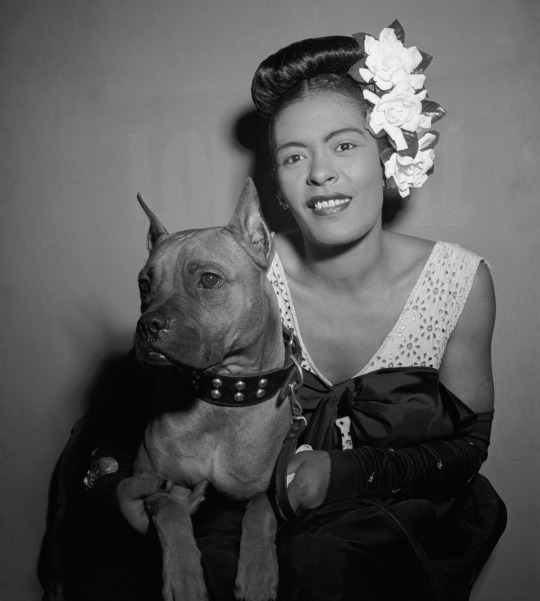
View On WordPress
#Artie Shaw#Bessie Smith#Billie Holiday#Count Basie#Jazz History#Jazz Vocalists#John Hammond#Louis Armstrong
10 notes
·
View notes
Text
BILLIE HOLIDAY
BILLIE HOLIDAY
1915-1959
Billie Holiday (Eleanora Fagan) was an American jazz and swing music artist who started singing in nightclubs in Harlem and signed a record contract in 1935. She had a hit with ‘What a Little Moonlight Can Do” and continued to have a successful career during the 1930s and 1940s.
Holiday was born in Philadelphia and was the daughter of an unwed teenage couple; her mother was thrown out of her home due to becoming pregnant and her father left her mother to pursue a career in jazz. In 1926, her mother came home to discover the neighbour attempting to rape Holiday, Holiday successfully fought back and the man was arrested.
Holiday gained a drug problem during the early 1940s. She married trombonist Jimmy Monroe in 1941, she had an affair with trumpeter Joe Guy her drug dealer. Holiday divorced Monroe in 1947 and broke up with Guy. She had a short prison sentence in 1947 for possession of narcotics and was sent to prison. She was released and returned to Newark where her pianist Bobby Tucker and her dog Mister was waiting, Mister leaped at Holiday with excitement, it knocked off her hat and “loved me like crazy”.
In 1959, Holiday was diagnosed with cirrhosis of the liver. She started losing weight and her friends persuaded her to go to the hospital which she did on 31 May, for treatment of liver and heart disease.
The Feds went to the hospital claiming they found heroin in her bedroom and she was arrested and handcuffed to her bed and placed under police guard. Whilst she lay dying the police raided her hospital room looking for drugs. She died on 17 July 1959, aged 44 of pulmonary edema and heart failure caused by cirrhosis.
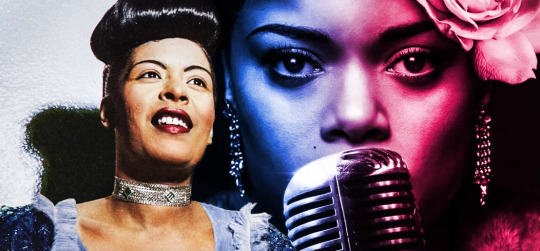
#billieholiday
5 notes
·
View notes
Text

Remembering Billie Holiday 💙
(born Eleanora Fagan April 7, 1915 – July 17, 1959) was an American jazz singer and songwriter.
Nicknamed "Lady Day" by her friend and musical partner Lester Young, Holiday had a seminal influence on jazz and pop singing. Her vocal style, strongly inspired by jazz instrumentalists, pioneered a new way of manipulating phrasing and tempo.
Photo cover from the album: Lady in Satin, 1958
17 notes
·
View notes
Text

Billie Holiday (born Eleanora Fagan; April 7, 1915 – July 17, 1959) was an American jazz and swing music singer. Nicknamed "Lady Day" by her friend and music partner, Lester Young, Holiday had an innovative influence on jazz music and pop singing. Her vocal style, strongly inspired by jazz instrumentalists, pioneered a new way of manipulating phrasing and tempo. She was known for her vocal delivery and improvisational skills. Holiday won four Grammy Awards, all of them posthumously, for Best Historical Album. She was inducted into the Grammy Hall of Fame and the National Rhythm & Blues Hall of Fame. After a turbulent childhood, Holiday began singing in nightclubs in Harlem, where she was heard by producer John Hammond, who liked her voice. She signed a recording contract with Brunswick in 1935. Collaborations with Teddy Wilson produced the hit "What a Little Moonlight Can Do", which became a jazz standard. Throughout the 1930s and 1940s, Holiday had mainstream success on labels such as Columbia and Decca. By the late 1940s, however, she was beset with legal troubles and drug abuse. After a short prison sentence, she performed at a sold-out concert at Carnegie Hall. She was a successful concert performer throughout the 1950s with two further sold-out shows at Carnegie Hall. Because of personal struggles and an altered voice, her final recordings were met with mixed reaction but were mild commercial successes. Her final album, Lady in Satin, was released in 1958. Holiday died of cirrhosis on July 17, 1959, at age 44. In 2000, she was also inducted into the Rock & Roll Hall of Fame as an early influence; their website states that "Billie Holiday changed jazz forever". She was named one of the 50 Great Voices by NPR; and was ranked fourth on the Rolling Stone list of "200 Greatest Singers of All Time" (2023). Several films about her life have been released, most recently The United States vs. Billie Holiday (2021).
8 notes
·
View notes
Text
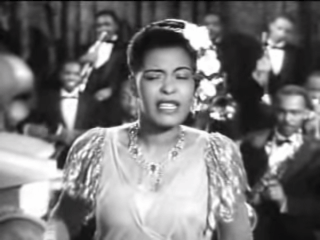


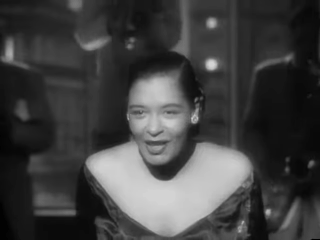
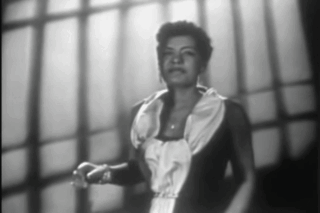
Eleanora Fagan (April7,1915-July17,1959), Billie Holiday, was a jazz musician and singer-songwriter nicknamed “ Lady Day.” Even though she had no formal vocal training, her delivery and improvisational skills made up for it. After a rough childhood, she began singing in nightclubs in Harlem, where she was heard by producers John and Teddy Wilson and signed a contract with Brunswick Records. She released several songs which are now jazz standards. She found mainstream success when she signed with Columbia and Decca Records—despite her success, Holiday had drug, health, and legal problems. She was under scrutiny from federal drug agents because of her use of drugs. Her song “ Strange Fruit” raised some eyebrows because of its lyrical content at the time Holiday stayed active in the Civil Rights movement, wanting to integrate her shows. She received posthumous Grammy Awards. There is now a film covering the tumultuous part of her career. Holiday’s voice is still impressive, influencing vocalists today.
2 notes
·
View notes
Photo
“… Holiday stood on the bandstand, hardly moving – an elegantly gowned beauty with a gardenia in her pulled-back hair. Holiday’s small, wailing voice revealed a woman who lived for love and would possibly die for it. She both luxuriated in her suffering and gave it dignity, even in “My Man” in which she sang: “He isn’t true / He beats me too / What can I do?” Holiday’s singing was pure autobiography, tied to stylistic quirks that are copied to this day: seductively bent notes that sounded like sighs; a thin, brassy edge that evoked a muted trumpet; a languid delivery that could drag perilously behind the beat yet never fell out of time. Her life was cloaked in tabloid scandal, much of it involving her addictions to heroin and abusive men. She lived her saddest songs to such a reckless degree that she died at forty-four.”
/ From Is That All There Is? The Strange Life of Peggy Lee (2014) by James Gavin /
“I saw the whole world in that face. All of the beauty and all of the misery.”
/ From the documentary Billie (2020) /
Died 65 years ago today: regal, soulful and ravaged jazz chanteuse Billie Holiday (née Eleanora Fagan, 7 April 1915 – 17 July 1959). Lady Day’s bruised but defiant (and sexy as hell) spirit lives every time you listen to her music. My favourite songs of hers will always be “I’m a Fool to Want You”, “Don’t Explain”, “You’ve Changed” and “Good Morning Heartache.” The greatest living interpreter of the Holiday songbook is Joey Arias.
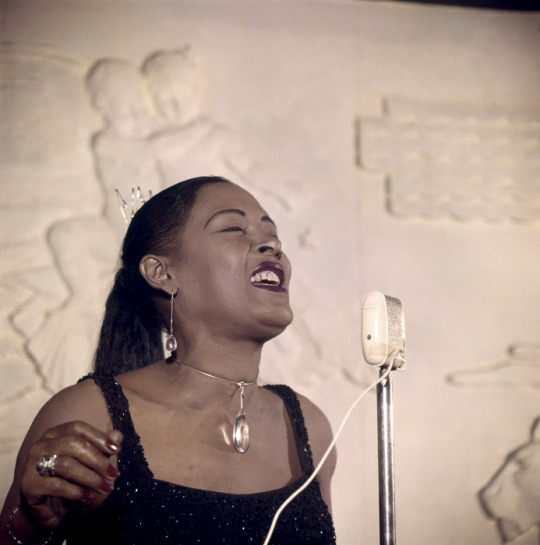
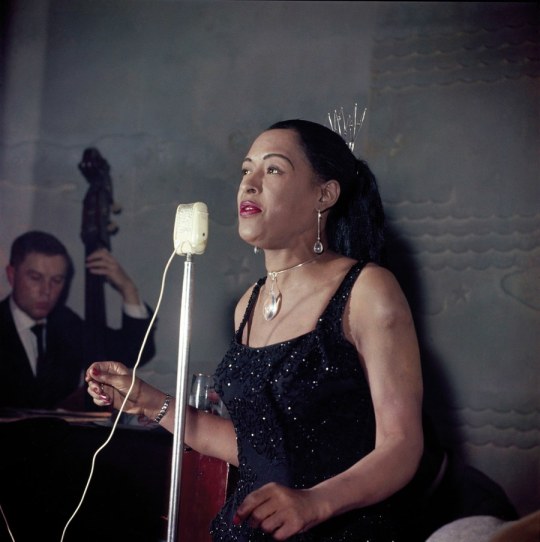
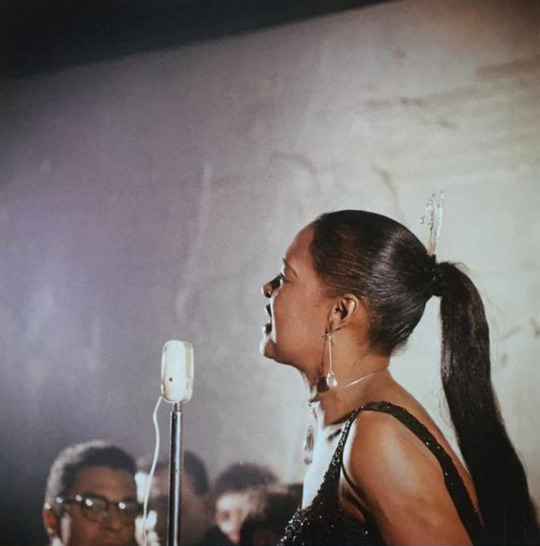
Billie Holiday performing at the Mars Club in Paris on November 20, 1958.
Photos by Jean Pierre Leloir
#billie holiday#jazz#jazz music#jazz diva#jazz chanteuse#lady day#elegance#glamour#ravaged#defiant#kween#fierce#blues music#african american#black glamour
6K notes
·
View notes
Text




On this day, July 17, eight years apart, the world lost Billie Holiday and John Coltrane
Billie Holiday (born Eleanora Fagan)—April 7, 1915 – July 17, 1959
John William Coltrane—September 23, 1926 – July 17, 1967
2 notes
·
View notes
Text





7 APRILE 1915 nasceva BILLIE HOLIDAY
"Non tardai molto a diventare una schiava tra le meglio pagate. Prendevo anche mille dollari alla settimana, ma quanto a libertà non ne avevo più di quando ne potesse avere il più pidocchioso bracciante della Virginia, cento anni fa".
Cento e dieci anni fa la nascita di una delle più grandi interpreti del 900.
Una vita breve e intensa di dolore e trionfi.
Un talento immenso fatto di pathos e sensualità.
Che ieri come oggi la rende un modello.
I successi con le grandi orchestre e i piccoli combo, le truffe dei discografici e gli anni tristi.
Storia (senza stereotipi) della vita scandalosa di una creatura meravigliosa
Cosa resta oggi di BILLIE HOLIDAY?
Risposta scontata. Moltissimo.
Intanto la profonda bellezza che ha donato al mondo. E non solo quello del jazz.
Anzi. Nata Eleanora Fagan a Philadelphia il 7 aprile del 1915, Billie è stata - e resta - una delle più belle e influenti interpreti vocali del Novecento tout court. E il suo centesimo dalla nascita val bene qualche pensiero intorno a quella figura così incredibilmente dotata, sensuale, fragile, seducente.
Una pasoliniana disperata vitalità la sua, che unita al ciclopico talento musicale le ha aperto i cuori di milioni di persone. Con però, alla distanza, la discutibilissima prevalenza – il maledettismo, quello degli altri però, va sempre di moda – della prima sul secondo. Tesi che con molta ragione Cassandra Wilson, che le ha da poco dedicato un disco di abbagliante intelligenza, bellezza e sensibilità, sostiene con vigore.
Un omaggio il suo che, fra i pochi realizzati – anzi i pochissimi, a dispetto di ambita rotondità del centenario e fama del personaggio: solo altri due che si sappia, quello asciuttamente molto jazz dell’ottimo portoricano d'America Jose James e l’altro della vociante e troppo giovane inglese Rebecca Ferguson – brilla proprio per il suo compiuto desiderio di accendere, con bel piglio contemporaneo, lo splendore senza tempo di un classico moderno.
Che come Billie non può più scendere dall’Olimpo cui è saputa assurgere. Per, appunto, l’enormità di ciò che ebbe in dono e di cosa seppe farsene. E non, una volta per tutte, per le inenarrabili sofferenze, la miseria e le violenze sessuali da bambina, la prostituzione da adolescente, l’eroina (con processi e galera al seguito) e l’alcol che mise nel sangue per turare la voragine nella sua anima, gli infiniti amori folli e senza speranza, la segregazione durissima di cui per tutta la vita fece le spese. Malgrado una celebrità che tra gli afroamericani, fin lì, era toccata solo al genio, anche di businessman, del però integerrimo e religiosissimo Duke Ellington.
0 notes
Text

Music History Today: April 7, 2025
April 7, 1915: Billie Holiday was born Eleanora Fagan in Philadelphia, Pennsylvania.
0 notes
Text

Eleanora Fagan (April 7, 1915 – July 17, 1959) professionally known as Billie Holiday, was a jazz singer with a career spanning nearly thirty years. Nicknamed “Lady Day” by her friend and music partner Lester Young, she had a seminal influence on jazz music and pop singing. Her vocal style, strongly inspired by jazz instrumentalists, pioneered a new way of manipulating phrasing and tempo. She was known for her vocal delivery and improvisational skills.
After a turbulent childhood, she began singing in nightclubs in Harlem, where she was heard by the producer John Hammond, who commended her voice. She signed a recording contract with Brunswick in 1935. Collaborations with Teddy Wilson yielded the hit “What a Little Moonlight Can Do”, which became a jazz standard. Throughout the 1930s and 1940s, she had mainstream success on labels such as Columbia and Decca.
She was a successful concert performer throughout the 1950s with two further sold-out shows at Carnegie Hall. Due to personal struggles and an altered voice, her final recordings were met with mixed reactions but were mild commercial successes. Her final album, Lady in Satin, was released in 1958.
“Strange Fruit” is a euphemism for the lynched bodies of African Americans hanging and swaying from trees. Strange Fruit is the name of one of the most powerful protest songs ever written. Her 1939 version of the song was included in the National Recording Registry on January 27, 2003.
She won four Grammy Awards, all of them posthumously, for Best Historical Album. She was inducted into the Grammy Hall of Fame in 1973. Lady Sings the Blues, was released in 1972. She is the primary character in the play Lady Day at Emerson’s Bar and Grill; the role was originated by Reenie Upchurch in 1986 and was played by Audra McDonald on Broadway and in the film. She was inducted into the National Rhythm & Blues Hall of Fame. #africanhistory365 #africanexcellence
1 note
·
View note
Link
0 notes
Text

Billie Holiday and Ella Fitzgerald.
Billie Holiday (born Eleanora Fagan; April 7, 1915 – July 17, 1959) was an American jazz and swing music singer. Nicknamed "Lady Day" by her friend and music partner, Lester Young, Holiday made a significant contribution to jazz music and pop singing. Her vocal style, strongly influenced by jazz instrumentalists, inspired a new way of manipulating phrasing and tempo. She was known for her vocal delivery and improvisational skills.
Ella Jane Fitzgerald (April 25, 1917 – June 15, 1996) was an American singer, songwriter and composer, sometimes referred to as the "First Lady of Song", "Queen of Jazz", and "Lady Ella". She was noted for her purity of tone, impeccable diction, phrasing, timing, intonation, and a "horn-like" improvisational ability, particularly in her scat singing. via W
1 note
·
View note